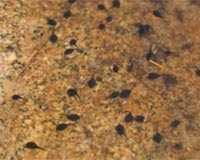| . |  |
. |
Riverside CA (SPX) Jun 11, 2009 What's the secret to surviving during times of environmental change? Evolve...quickly. A new article in The American Naturalist finds that guppy populations introduced into new habitats developed new and advantageous traits in just a few years. This is one of only a few studies to look at adaptation and survival in a wild population. A research team led by Swanne Pamela Gordon from the University of California, Riverside studied 200 guppies that had been taken from the Yarra River in Trinidad and introduced into two different environments in the nearby Damier River, which previously had no guppies. One Damier environment was predator-free. The other contained fish that occasionally snack on guppies. Eight years after their introduction, the team revisited the Damier guppies to see what adaptive changes they might have picked up in their new environments. The researchers found that the females had altered their reproductive effort to match their surroundings. In the environment where predators were present, females produced more embryos each reproductive cycle. This makes sense because where predators abound, one might not get a second chance to reproduce. In less dangerous waters, females produced fewer embryos each time, thus expending fewer resources on reproduction. Finally, the researchers wanted to see if these adaptive changes actually helped the new population to survive. So they took more guppies from the Yarra, marked them, and put them in the Damier alongside the ones that had been there for eight years. They found that the adapted guppies had a significant survival advantage over the more recently introduced group. In particular, juveniles from the adapted population had a 54 to 59 percent increase in survival rate over those from the newly introduced group. In the long run, survival of juveniles is crucial to the survival of the population, the researchers say. The fact that fitness differences were found after only eight years shows just how fast evolution can work-for short-lived species anyway. "The changes in survival in our study may initially seem encouraging from a conservation perspective," the authors write. "[B]ut it is important to remember that the elapsed time frame was 13-26 guppy generations. The current results may therefore provide little solace for biologists and managers concerned with longer-lived species." Share This Article With Planet Earth
Related Links The American Naturalist Darwin Today At TerraDaily.com
 It's raining tadpoles in Japan town, residents say
It's raining tadpoles in Japan town, residents sayTokyo (AFP) June 10, 2009 Meteorologists in Japan say the rainy season has just started in Tokyo, but residents in a small coastal town have reported a different phenomenon -- tadpoles dropping out of the sky. An office clerk in Nanao said he first noticed the anomaly when he heard a dull thud in a parking lot last week, news reports said. Looking around, he saw about 100 dead amphibians splattered on car windshields ... read more |
|
| The content herein, unless otherwise known to be public domain, are Copyright 1995-2009 - SpaceDaily. AFP and UPI Wire Stories are copyright Agence France-Presse and United Press International. ESA Portal Reports are copyright European Space Agency. All NASA sourced material is public domain. Additional copyrights may apply in whole or part to other bona fide parties. Advertising does not imply endorsement,agreement or approval of any opinions, statements or information provided by SpaceDaily on any Web page published or hosted by SpaceDaily. Privacy Statement |